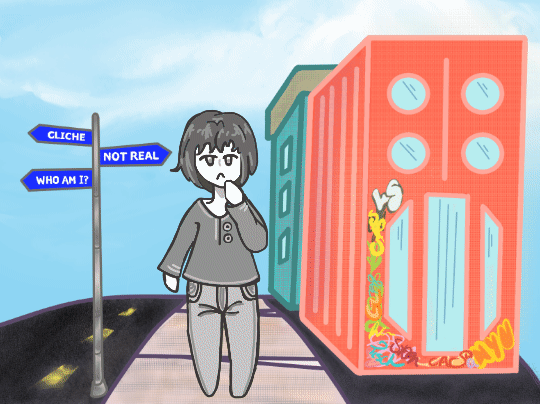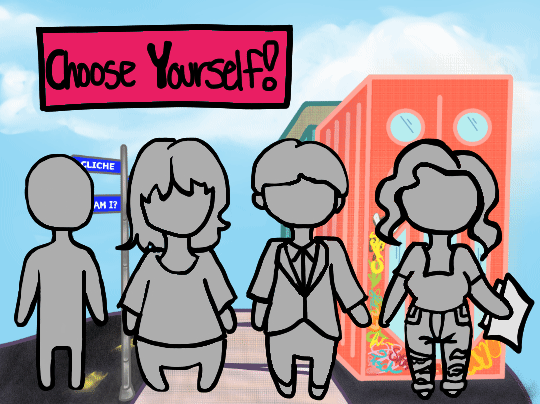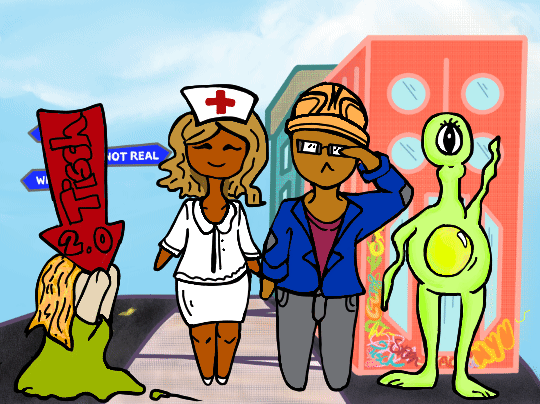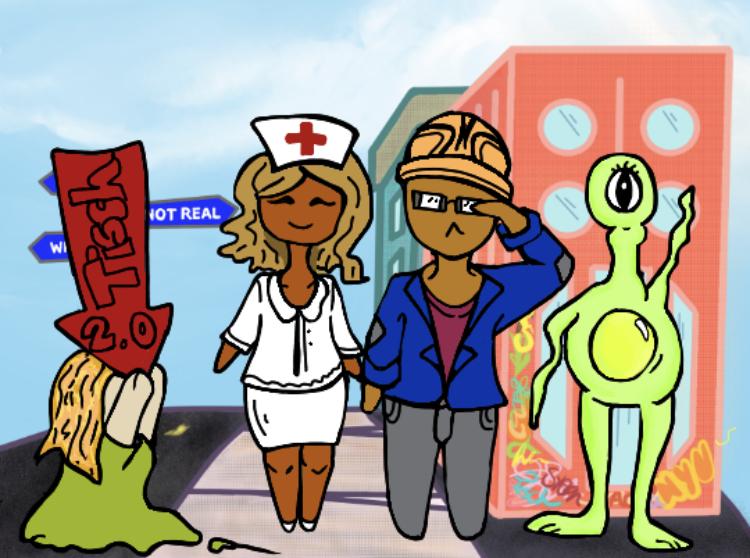
A Tisch student enigmatically takes a drag on her cigarette as she belts her latest solo with the accompaniment of 50 of her acting cohorts on the corner of Broadway. A Stern student dreams of eating his competitors for breakfast, unmistakable in a crisp three-piece suit and accompanying briefcase. A CAS pre-med student declares their plans to switch majors after a particularly taxing organic chemistry class for the third time this week. All are familiar NYU school-based stereotypes that have penetrated the minds of the student body from social media meme pages and beyond.
Most students recognize these as caricatures of typical students that can serve as a laugh or an identity to connect with, whether you come from CAS or Gallatin. To some extent, these jokes unite the students of each field of study within NYU. From first-years to seniors, everyone knows they have a program to be proud of and a community of like-minded peers within it.
First-year CAS biology student Julia Sabino said that when she’s asked her school and major, the jokes and stereotypes associated with them can actually give her a sense of pride when answering.
“It’s kind of known that they’re jokes. They’re said in joking ways, and when you apply to those schools, you know they’re happening,” Sabino said. “For example, I know I’m that cliche, pre-med bio kid. But, I have pride — I know that’s what I want to do. I know I’m going to get somewhere. It’s more of an empowering thing.”
For Sabino, following the expected path of majoring in biology before applying to medical school was a cliche to embrace. Unfortunately, other cliches can be double-edged swords, oversimplifying the goals of students in each school. They set standards that real students have trouble meeting, causing some to skew their own natural development toward becoming a poster child for their school only to be scorned by these outside of the NYU bubble if they succeed.
For Gallatin senior Katherine Robertson, reactions to her explaining her individualized major, dubbed “Storytelling,” tend to take one of two forms: demands that she be as interesting as possible or questions of whether she’ll ever be employable.
“I’ve learned that I’ve had to perfect a sort of pitch for other people, so people will say my major’s so interesting.” she said. “And then I’ll feel like I did it: I’ve fulfilled the stereotype. But, it’s always either ‘Gallatin kids are really smart and interesting,’ or people say they’re just messing around, and hopefully they’ll get a job. I have to kind of prove it’s real for those people.”
As Robertson noted, the flip side of school stereotypes is the dismissal students encounter when they conform to those stereotypes. This is especially true in the case of those who dismiss Gallatin as a school of useless majors. Robertson, who will finish her Gallatin studies in the spring, named college-age students as the primary group that ridiculed her individualized major path for its lack of apparent career outcomes.
“‘Are you worried about finding a job? Your life prospects?’ Most people who say those things are other students, because, in college, it’s really easy to get tied to what you’re studying, especially if there’s one set progression for it,” Robertson said. “A lot of my friends get really stressed and they wonder, ‘What if my major doesn’t hold up? What if I don’t get hired?’”
As Robertson’s peers grew concerned for their own employability, they projected their own insecurities onto a Gallatin student, the easiest target — according to memes, at least.

Stern students face the reverse issue. They aren’t scorned for their career prospects but for having ruthless, career-focused personalities. Because Stern is a business school, other students can more easily stereotype individuals from Stern, as compared to those from CAS, which has such a wealth of majors that students are hard to pigeonhole.
Stern sophomore Rohan Vora contended that while there is some truth within the stereotype, it tends to be quite exaggerated.
“The stereotype of Stern students being hyper-career-focused isn’t really false, but a bit overstated,” Vora said. “I personally don’t mind it too much. I’d imagine some people here kinda relish that reputation, but it’s not really my cup of tea.”
Ultimately, the victim of stereotyping is not Stern students’ reputation but their wellbeing itself. The combination of a cutthroat learning environment and the unspoken demands of fitting the Stern standard mentally burden many of the Stern students who deviate from the norm.
“There’s definitely a bit of impostor syndrome that comes with being thrown into such a driven and competitive environment without feeling like you fit that mold,” Vora continued. “I often get the feeling that I’m the only person there who doesn’t know what they’re doing, which — as I sometimes have to convince myself — is ridiculous!”
Given Stern’s internal pressures, it’s worth asking whether external competition with other NYU programs has any influence on the school’s students. When asked about the impact of the perceived competition between CAS and Stern economics, Vora stated it did not truly affect Stern students.
“It’s kinda like the rivalry between NYU and Columbia in that only CAS econ thinks it’s a rivalry,” Vora said. “I don’t think there’s a lot of animosity.”
Meanwhile CAS economics majors maintain that an inter-school rivalry exists, as both groups of students will be competing for similar job opportunities in the future. CAS senior Marc Waldeck, an economics major, considers the rivalry real and believes the perspective of Stern students speaks to their perception of NYU as a whole.
“It’s a rivalry. That would definitely be an accurate word for it,” Waldeck stated. “Stern has a reputation as a business school that breeds a certain type of student with a false sense of being above everyone else. They don’t think there’s a rivalry because they think they go to a different school. They don’t think they go to NYU. They think they go to Stern.”
What accounts for the blatant contrast between Stern students’ and CAS students’ standpoints on the matter? It seems the differences in reputation provide one side, Stern economics, a greater need to focus on internal competition, but this causes the other side, CAS economics, to feel it has something to prove.

A similar situation exists for those in Steinhardt, as many Steinhardt students with majors similar to those offered in other schools feel belittled by their peers. Steinhardt students majoring in the arts must continually deal with being seen as what Steinhardt senior Eric Gelb called “the Tisch knock-off.”
Gelb, the current director of NYU Lamplighters, an all-university theater organization, often feels his identity as a Steinhardt student, who has succeeded in theater performance, comes with the burden of proving he deserves the same respect as Tisch students do in the theater community.
“I’m studying educational theater, which is like a teaching and theater hybrid, so most people think, ‘Oh, you want to be a drama teacher?’ Or, they think I wanna do Aladdin Jr. with five-year-olds,” Gelb said. “Sometimes I do, but also part of me wants to work professionally in commercial theater, like I’ve done in ‘Wicked’ or in ‘Head Over Heels.’ I do sometimes get the sense of Tisch people wondering, ‘Why is he doing that?’ As in, he should just stay and just do the teaching thing.”
As in the case of the Stern and CAS economics dynamic, most from Tisch do not consciously put themselves on higher ground. Caroline McPherson, a Tisch first-year, clarified that the seniors in her studio have never outwardly dismissed Steinhardt students or regarded them with animosity.
“I’ve heard that there’s some familial tension,” McPherson said. “Like, there’s joking tension but it’s not anything real. We don’t really talk about Steinhardt. It’s almost in a different world.”
If the tensions between schools aren’t actively caused by any one group, why do they still affect one side so deeply? As the memes and teasing jokes have entered the student body’s collective language, it seems that they’ve normalized an unconscious subtext of biases people carry regarding each NYU school. As the general student body internalizes these biases, students from those schools become more aware of the subtext that diminishes them and their achievements. As a result, they’re constantly faced with measuring up to a competitor they didn’t ask for.
According to Gelb, the comments that cause tension arrive in the shadow of what was intended as harmless school pride.
“There are definitely some hard feelings,” Gelb said. “The things I’ve seen online from people like that which raise red flags aren’t comments about us [Steinhardt students]. They’re more things that people are using in reference to themselves that imply everyone else not at Tisch is just on a different level. Having led a lot of the shows on campus, I see there’s always that subtext that comes with people being surprised someone that does not come from Tisch leads in that way.”
These constricting expectations and students’ desire to go beyond them only amplify the academic stresses of NYU life, forming a pressure cooker setting for NYU students. Students lean toward merely developing thicker skin, but other, more extreme solutions have emerged to allow students to showcase their talents beyond the perceived limits that come with their programs.
Student directors and club leaders, including Gelb, have taken to using a method akin to affirmative action in recruiting students whose schools aren’t as well known for their participation in a particular extracurricular activity.
“It’s always been very important to me that the theater club I’m doing right now and all the Steinhardt shows are dominated by non-Tisch folks,” Gelb said. “Not because Tisch people are bad, but because there are a lot of opportunities that already exist there.”
Many newer, all-university clubs, including Design Initiative, pride themselves on appointing student officers and e-board members without regard for school affiliation; other organizations, such as the climate justice group TREEage, have made an effort to build their memberships from not only different NYU schools but also the student bodies of other universities in the five boroughs. In both cases, student clubs seem to bridge the divide between students who belong to different programs and unite students through extracurriculars or causes that affirm their sense of individuality outside of their studies.
While these solutions may be effective, they don’t eliminate the root of the problem, which concerns how NYU students view and interact with each other. The mental strain caused by the stereotypes ingrained in the reputations of certain NYU schools is difficult for students to overcome, given that school has become a central aspect of many students’ identities. Faced with a choice between being cliche or a disappointment, most students find themselves in a catch-22.
Perhaps the best solution at this point is consciously making an effort to view other students as people before students of their respective schools, even though memes may be the only lens through which some students are exposed to schools aside from their own.
All animations by Sammy Tavassoli.
Email Sammy Tassavoli at [email protected].























































































































































